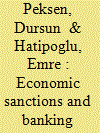| Srl | Item |
| 1 |
ID:
157832


|
|
|
|
|
| Summary/Abstract |
What effect do economic sanctions have on the stability of banking systems in targeted economies? This manuscript advances the hypothesis that economic sanctions increase the likelihood of systematic banking crises by deteriorating the target economy’s macroeconomic conditions and limiting its access to international capital. To test the argument, we gathered data for over 125 emerging economies for the years from 1970 to 2005. The findings indicate that sanctions are likely to raise the probability of banking crises. The results also show that financial sanctions are more detrimental to the stability of banking systems than trade sanctions. Further, we find that the hypothesized effect of sanctions is conditioned by the extent of economic cost inflicted on targeted economies. One major implication of the findings is that sanctions, as external shocks, can potentially destabilize the financial stability of target countries in addition to the well-documented adverse effects on economic growth, political stability, and humanitarian conditions.
|
|
|
|
|
|
|
|
|
|
|
|
|
|
|
|
| 2 |
ID:
156440


|
|
|
|
|
| Summary/Abstract |
Our paper investigates the relationship between financial stability and mortgage lending. We estimated the effect of the share of mortgage lending by individual banks (together with some control variables) on two measures of financial stability—the bank Z-score and the non-performing loan ratio—for a sample of 1889 banks in 65 advanced and emerging economies for the period 1987–2014 from the Bankscope database. We specifically compared the behavior of banks in Europe and Asia. We find evidence that an increased share of mortgage lending is positive for financial stability, specifically by lowering the probability of default by financial institutions and reducing the non-performing loan ratio, at least in non-crisis periods, for levels of mortgage shares up to 49–68%. For higher levels of mortgage lending shares, the impact on financial stability turns negative. Also, the occurrence of a banking crisis reduces the diversification benefits associated with mortgage lending. Compared with the base sample, Asian banks show greater financial stability during non-crisis periods, but are more negatively affected by a higher mortgage ratio during crisis periods, while European banks show greater financial stability during non-crisis periods, but are less negatively affected during crisis periods. Finally, a higher level of regulatory quality improves both financial stability measures, but the effects of macroprudential measures are found to be mixed.
|
|
|
|
|
|
|
|
|
|
|
|
|
|
|
|